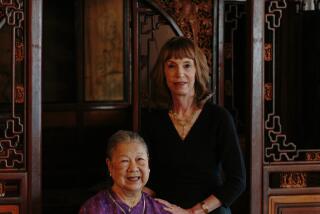LITTLE PLEASURES IN BAOTOWN
- Share via
In our age of unabashed materialism and selfishness, it’s refreshing to see another side of life, one that deals with “real” people, who may have it hard but who still appreciate life and are thankful for whatever little they have.
The Chinese village of “Baotown” (Book Review, Jan. 14) is a place we’d probably never hear about or never would want to hear about. If not for a cruel twist of fate (author) Wang Anyi would have never heard about it. But during the Cultural Revolution, 16-year-old Wang was banished to this poverty-stricken, isolated, rural, flood-infested village to learn from the workers, peasants and soldiers. And learn she did, far more than probably anyone expected, as living in this poor village for eight years provided her with enough rich material for a book.
Anyi shows that Baotown is a difficult place in which to live. In Baotown, blondes don’t have more fun (as yellow hair is a sign of malnutrition); it’s more exciting in Baotown to “get a bed” than to “go to bed” with someone (as material goods are scarce), and an abundance of water is no “Splash Mountain” to this village but rather signifies another flood has arrived.
However, in spite of their spartanlike existence abundant with hardships, there still is room for humor, wit, joy, absurdity and life’s “little pleasures” in Baotown. Being poor may deprive these humble people of basic necessities, but it did not deprive them of their character, dignity and love for life.
You might say Anyi has breathed life and emotion into the Chinese Cultural Revolution, an event often depicted in the West in a cold, official, propagandistic manner. The Cultural Revolution was about people, not just ideas.
KENNETH L. ZIMMERMAN
CYPRESS
More to Read
Sign up for our Book Club newsletter
Get the latest news, events and more from the Los Angeles Times Book Club, and help us get L.A. reading and talking.
You may occasionally receive promotional content from the Los Angeles Times.









